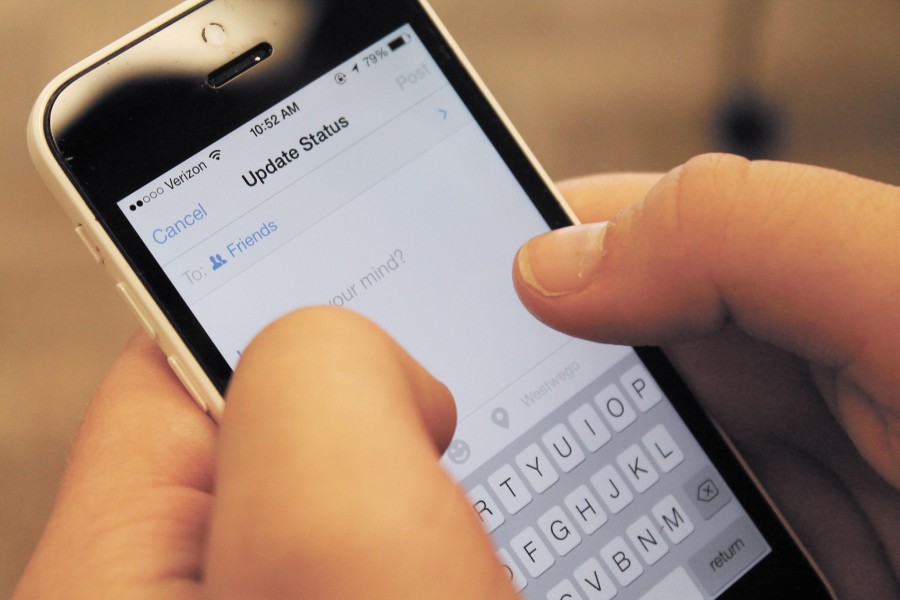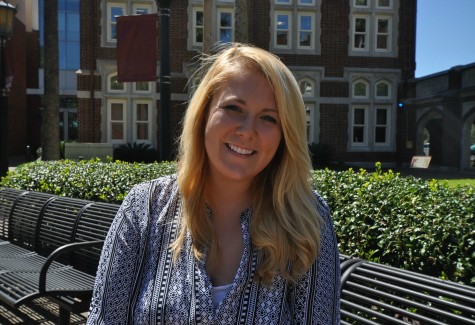It’s 2 a.m. and most college students are trying to get some sleep but are distracted. Their phones are buzzing with Facebook notifications, tweets, LinkedIn requests and iMessages.
They are just one of the 1 million millennials, whose lives have been taken over by technology, for better or for worse.
There’s no arguing with the facts. According to a study conducted by Pew Research Center in 2013, 97 percent of 18- to- 24- year olds in the U.S. own a cellphone. As for social networking, 83 percent are using social media. From 2012 to 2013, there was an increased use in all of the following social media sites: Facebook, LinkedIn, Twitter, Instagram and Pinterest.
Many scholars are linking Generation Y’s lack of social skills to their dependency on social media and hyperreality. Generation Y is commonly described as the generation born between the 1980s and the early 2000s.
Director of Campus Planning and Assessment and instructor of the freshman seminar class “iBrains,” Brad Petitfils, said he senses a feeling of helplessness amongst his students in regards to this hyperreality we live in.
“Hyperreality is a phrase coined by French theorist Jean Baudrillard. He actually wrote the book that The Matrix was based on,” Petitfils said. “A hyperreality is a place where everything is simulated and fine-tuned. We can edit to project a specific image of the self.”
In Petitfils’ “iBrains” class, formally called “Hyper Media and Hyper Learning,” his students are encouraged to facilitate open dialogs about their feelings on our technology obsessed world.
“More students seem to recognize the problem, which is encouraging. It’s not the fault of these students that they were born and raised into this world,” Petitfils said. “There’s a lot of frustration like ‘How can I change this?’ That is the sad part, this feeling of helplessness.”
Petitfils is not the only one to recognize this dependency on social media.
Leyla Mansur, psychology junior, learns about these ideas in her classes. She feels that social media magnifies certain adolescent issues.
In social psychology, students study the works of David Elkind, a psychologist who does his research on adolescents and egocentrism. Elkind uses the term personal fable, the idea that the individual’s story is unique and imaginary audience, the idea that you are always on watch.
“Through personal fable and imaginary audience, social media creates a platform for trying to exhibit this need for self promotion,” Mansur said. “When you’re scrolling down your Facebook newsfeed and you see all these accomplishments and achievements of your peers, it can leave you feeling depressed and questioning your own achievements.”
Petitfils is also wary of Generation Y’s dependency on the hyperreal word.
“What they see in their hyperreal spaces is togetherness, and they don’t have that. We don’t have that, collectively,” Petitfils said. “I think this is going to be one of the most difficult problems we’re going to face within the next half-century.”
Not only is there a dependency, Petitfils says there is serious lack of person-to-person communication.
“If you really think about it, when is the last time you and your friends sat around and had a really meaningful conversation? My students come in to talk to me about life, and I’m like ‘well what do your friends say?’ And they say, ‘Well nobody wants to talk about this.’ It’s so sad,” Petitfils said.
Mansur agrees with Petitfils in that conversing only on the Internet takes away from real world interactions that we desperately need in order to have adequate social skills.
“So when you’re interacting on Facebook and text message, there’s really no need to develop social skills, you’re simply responding and you can take time to formulate an appropriate response,” Mansur said. “Compared to when you’re conversing in person, you have to be able to be an active participant in a conversation. I think Facebook takes away our ability to develop accurate social skills.”
It’s not just scholars and psychology students who are making these connections. Marketing junior Zoe McCormick “hates” the dependency on texting and Facebook.
“I really hate the fact that the only way to communicate with my friends is through text messaging or Facebook because I feel like it’s a lot less personal. When you’re texting, not only do things get lost in translation, you also lose a lot of the meaning behind conversation,” McCormick said.
Although the problem has been recognized, the dependency is rapidly increasing.
“Facebook just turned 10, the big social network before that was Myspace, before that there was AOL. And then they just go away, shrivel up and fade into the background. Then they’re replaced with something else, something bigger,” Petitfils said.
Whether or not we approve of this dependency is irrelevant – millennials will still fall asleep to the sounds of their phones buzzing, distracted by this hyperreality we live in.
Melanie Potter may be reached at [email protected].









